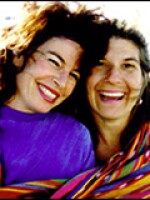LULU GARCIA-NAVARRO, HOST:
Pioneering filmmaker Agnes Varda, part of the French New Wave of the 1960s, died this week at age 90. Varda broke ground in features, documentaries, photography and art installations. Her work often focused on feminist issues and social commentary with a distinctive, experimental style. One of her most recent films, "Faces Places," a collaboration with the activist French photographer JR, was recently nominated for an Academy Award for best documentary. Agnes herself received an honorary Oscar for her life's work in 2017.
Our friends the Kitchen Sisters, Davia Nelson and Nikki Silva, interviewed Agnes for their latest NPR series, The Keepers: Stories of Activists, Archivists and Rogue Librarians. Here are a few moments from their conversation with her in her home in Paris.
AGNES VARDA: My name is Agnes Varda. I'm a French film director and artist.
UNIDENTIFIED PERSON: I am doing a series of stories for NPR called The Keepers.
VARDA: Keepers?
UNIDENTIFIED PERSON: Keepers.
VARDA: This is about keeping. I keep nothing. I'm not a good person for your subject because I lose a lot. (Laughter). I made my first film. I was 26.
(SOUNDBITE OF AGNES VARDA FILM)
UNIDENTIFIED ACTOR #1: (As character, speaking French).
UNIDENTIFIED ACTOR #2: (As character, speaking French).
VARDA: From my birth to 25, I'd seen less than 10 films. I'd never go.
(SOUNDBITE OF FILM, "SNOW WHITE AND THE SEVEN DWARVES")
UNIDENTIFIED ACTOR #3: (As Snow White, singing in French).
VARDA: I saw "Snow White And The Seven Dwarfs" when it came out, didn't like it too much. I found she was stupid.
(SOUNDBITE OF FILM, "SNOW WHITE AND THE SEVEN DWARVES")
UNIDENTIFIED ACTOR #3: (As Snow White, singing in French).
VARDA: I was not raised with films. And when Alain Resnais did the editing on my first film, he said you should go to the Cinematheque.
(SOUNDBITE OF 20TH CENTURY FOX THEME SONG)
VARDA: I didn't even know we had one in Paris. And Alain would always say that if I'd seen the masterpieces of film that I saw later, maybe I would not have started. I dared to make a film without knowing about film. I met Henri Langlois. He's an inventor. He invented the French Cinematheque. He invented the idea that we should keep including the films we don't like, not only the so-called masterpieces. He also said, what about films that we don't like? Maybe they make sense. Maybe they tell something about the society. In the States, Scorsese was an incredible champion about thinking we should have to keep films.
(SOUNDBITE OF MUSIC)
VARDA: We are facing roses about to die. But I kept like this because I received that bouquet of roses for the Oscar that I got in the States two or three weeks ago. In a little time, I have to throw them away and forget about Oscar. If I cannot keep all my memories because I am losing them, I remember Luis Bunuel, who said at one point, forget about commemoration, vivre oublie (ph) - hell, forgetting. So we should say that sometimes.
(SOUNDBITE OF SONG, "SUPPLIQUE POUR ETRE ENTERRE A LA PLAGE DE SETE")
GEORGES BRASSENS: (Singing in French).
VARDA: Who is a keeper? What should we keep? I don't know. I keep only what I like a lot. And the rest, I forget it. Not keeping what is important but keeping the side (ph) of the life, you know? It's just dealing with the ephemeral of life and the beauty of it. I don't know what I'm keeping, try to keep my body warm. I put some wool on my back. And I keep faith in art.
(SOUNDBITE OF MUSIC)
GARCIA-NAVARRO: This remembrance of Agnes Varda was produced by The Kitchen Sisters with Selene Ross and mixed by Jim McKee. You can hear more stories from The Keepers series on the podcast, The Kitchen Sisters Present. Transcript provided by NPR, Copyright NPR.

